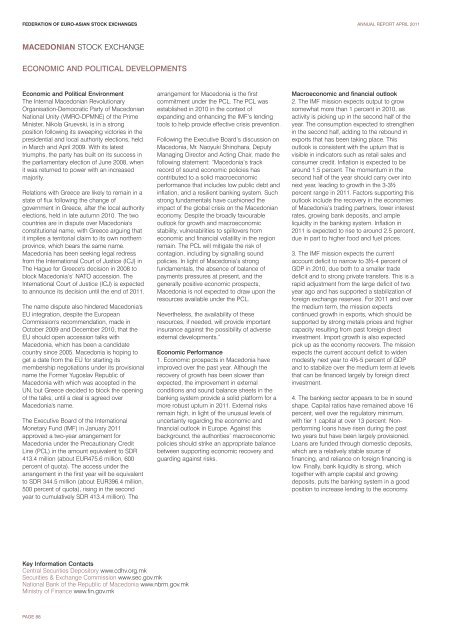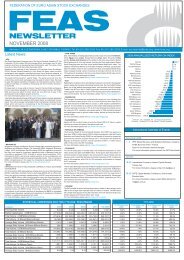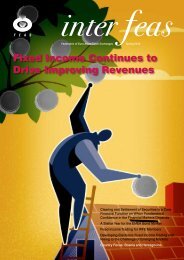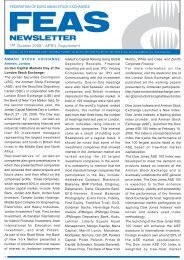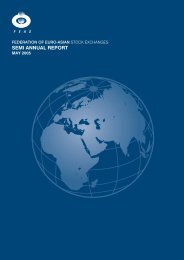Download - FEAS
Download - FEAS
Download - FEAS
You also want an ePaper? Increase the reach of your titles
YUMPU automatically turns print PDFs into web optimized ePapers that Google loves.
FEDERATION OF EURO-ASIAN STOCK EXCHANGES ANNUAL REPORT APRIL 2011<br />
MACEDONIAN STOCK EXCHANGE<br />
ECONOMIC AND POLITICAL DEVELOPMENTS<br />
Economic and Political Environment<br />
The Internal Macedonian Revolutionary<br />
Organisation-Democratic Party of Macedonian<br />
National Unity (VMRO-DPMNE) of the Prime<br />
Minister, Nikola Gruevski, is in a strong<br />
position following its sweeping victories in the<br />
presidential and local authority elections, held<br />
in March and April 2009. With its latest<br />
triumphs, the party has built on its success in<br />
the parliamentary election of June 2008, when<br />
it was returned to power with an increased<br />
majority.<br />
Relations with Greece are likely to remain in a<br />
state of flux following the change of<br />
government in Greece, after the local authority<br />
elections, held in late autumn 2010. The two<br />
countries are in dispute over Macedonia's<br />
constitutional name, with Greece arguing that<br />
it implies a territorial claim to its own northern<br />
province, which bears the same name.<br />
Macedonia has been seeking legal redress<br />
from the International Court of Justice (ICJ) in<br />
The Hague for Greece's decision in 2008 to<br />
block Macedonia’s’ NATO accession. The<br />
International Court of Justice (ICJ) is expected<br />
to announce its decision until the end of 2011.<br />
The name dispute also hindered Macedonia's<br />
EU integration, despite the European<br />
Commission's recommendation, made in<br />
October 2009 and December 2010, that the<br />
EU should open accession talks with<br />
Macedonia, which has been a candidate<br />
country since 2005. Macedonia is hoping to<br />
get a date from the EU for starting its<br />
membership negotiations under its provisional<br />
name the Former Yugoslav Republic of<br />
Macedonia with which was accepted in the<br />
UN, but Greece decided to block the opening<br />
of the talks, until a deal is agreed over<br />
Macedonia's name.<br />
The Executive Board of the International<br />
Monetary Fund (IMF) in January 2011<br />
approved a two-year arrangement for<br />
Macedonia under the Precautionary Credit<br />
Line (PCL) in the amount equivalent to SDR<br />
413.4 million (about EUR475.6 million, 600<br />
percent of quota). The access under the<br />
arrangement in the first year will be equivalent<br />
to SDR 344.5 million (about EUR396.4 million,<br />
500 percent of quota), rising in the second<br />
year to cumulatively SDR 413.4 million). The<br />
arrangement for Macedonia is the first<br />
commitment under the PCL. The PCL was<br />
established in 2010 in the context of<br />
expanding and enhancing the IMF’s lending<br />
tools to help provide effective crisis prevention.<br />
Following the Executive Board’s discussion on<br />
Macedonia, Mr. Naoyuki Shinohara, Deputy<br />
Managing Director and Acting Chair, made the<br />
following statement: “Macedonia’s track<br />
record of sound economic policies has<br />
contributed to a solid macroeconomic<br />
performance that includes low public debt and<br />
inflation, and a resilient banking system. Such<br />
strong fundamentals have cushioned the<br />
impact of the global crisis on the Macedonian<br />
economy. Despite the broadly favourable<br />
outlook for growth and macroeconomic<br />
stability, vulnerabilities to spillovers from<br />
economic and financial volatility in the region<br />
remain. The PCL will mitigate the risk of<br />
contagion, including by signalling sound<br />
policies. In light of Macedonia’s strong<br />
fundamentals, the absence of balance of<br />
payments pressures at present, and the<br />
generally positive economic prospects,<br />
Macedonia is not expected to draw upon the<br />
resources available under the PCL.<br />
Nevertheless, the availability of these<br />
resources, if needed, will provide important<br />
insurance against the possibility of adverse<br />
external developments.”<br />
Economic Performance<br />
1. Economic prospects in Macedonia have<br />
improved over the past year. Although the<br />
recovery of growth has been slower than<br />
expected, the improvement in external<br />
conditions and sound balance sheets in the<br />
banking system provide a solid platform for a<br />
more robust upturn in 2011. External risks<br />
remain high, in light of the unusual levels of<br />
uncertainty regarding the economic and<br />
financial outlook in Europe. Against this<br />
background, the authorities’ macroeconomic<br />
policies should strike an appropriate balance<br />
between supporting economic recovery and<br />
guarding against risks.<br />
Macroeconomic and financial outlook<br />
2. The IMF mission expects output to grow<br />
somewhat more than 1 percent in 2010, as<br />
activity is picking up in the second half of the<br />
year. The consumption expected to strengthen<br />
in the second half, adding to the rebound in<br />
exports that has been taking place. This<br />
outlook is consistent with the upturn that is<br />
visible in indicators such as retail sales and<br />
consumer credit. Inflation is expected to be<br />
around 1.5 percent. The momentum in the<br />
second half of the year should carry over into<br />
next year, leading to growth in the 3-3½<br />
percent range in 2011. Factors supporting this<br />
outlook include the recovery in the economies<br />
of Macedonia’s trading partners, lower interest<br />
rates, growing bank deposits, and ample<br />
liquidity in the banking system. Inflation in<br />
2011 is expected to rise to around 2.5 percent,<br />
due in part to higher food and fuel prices.<br />
3. The IMF mission expects the current<br />
account deficit to narrow to 3½-4 percent of<br />
GDP in 2010, due both to a smaller trade<br />
deficit and to strong private transfers. This is a<br />
rapid adjustment from the large deficit of two<br />
year ago and has supported a stabilization of<br />
foreign exchange reserves. For 2011 and over<br />
the medium term, the mission expects<br />
continued growth in exports, which should be<br />
supported by strong metals prices and higher<br />
capacity resulting from past foreign direct<br />
investment. Import growth is also expected<br />
pick up as the economy recovers. The mission<br />
expects the current account deficit to widen<br />
modestly next year to 4½-5 percent of GDP<br />
and to stabilize over the medium term at levels<br />
that can be financed largely by foreign direct<br />
investment.<br />
4. The banking sector appears to be in sound<br />
shape. Capital ratios have remained above 16<br />
percent, well over the regulatory minimum,<br />
with tier 1 capital at over 13 percent. Nonperforming<br />
loans have risen during the past<br />
two years but have been largely provisioned.<br />
Loans are funded through domestic deposits,<br />
which are a relatively stable source of<br />
financing, and reliance on foreign financing is<br />
low. Finally, bank liquidity is strong, which<br />
together with ample capital and growing<br />
deposits, puts the banking system in a good<br />
position to increase lending to the economy.<br />
Key Information Contacts<br />
Central Securities Depository www.cdhv.org.mk<br />
Securities & Exchange Commission www.sec.gov.mk<br />
National Bank of the Republic of Macedonia www.nbrm.gov.mk<br />
Ministry of Finance www.fin.gov.mk<br />
PAGE 88


